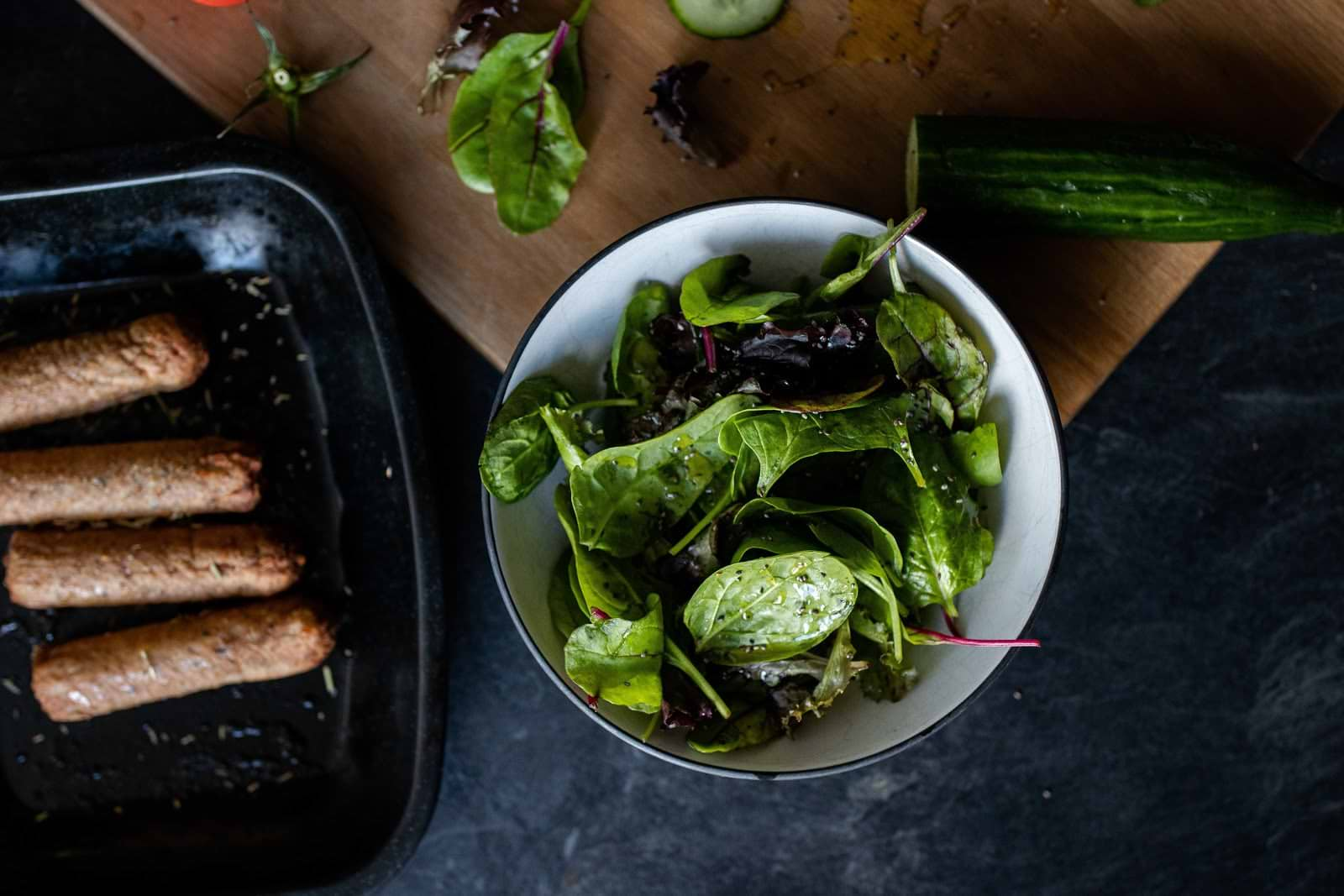Everything You Need to Know About the Autoimmune Diet
The incidence of autoimmune disease is on the rise. A scientific report from Connect Immune Research indicates “many autoimmune conditions are becoming more common, with some increasing in incidence by as much as 9% each year” (1).
According to Virginia T. Ladd, the President and Executive Director of the American Autoimmune Related Diseases Association, “the rapid increase in autoimmune diseases clearly suggests that environmental factors are at play — genes do not change in such a short period of time” (2).
Current knowledge suggests diet, the gut microbiome, immunity, and autoimmune disorders are closely connected (3). (P.S., How healthy is your gut? Find out with our free gut health assessment.)
Many people with autoimmune conditions are turning to a more holistic approach to manage their symptoms, as a way to replace or complement the traditional pharmacological approach to autoimmune disorders. Enter the autoimmune diet.
The autoimmune diet, also referred to as the autoimmune protocol or anti-inflammatory diet, is designed to lower inflammation, a common symptom of autoimmune conditions. Here’s everything you need to know about the autoimmune diet.
What Is an Autoimmune Diet?

The autoimmune diet is simply a stricter extension of the popular paleo diet. It lowers systemic inflammation in the body by reducing foods that promote inflammation and increasing anti-inflammatory foods (4).
There are three main phases of the autoimmune diet: elimination, maintenance, and reintroduction.
Phase One: Elimination
During this initial phase, you eliminate foods commonly known to trigger inflammation, such as grains, legumes, nightshades, dairy, eggs, coffee, alcohol, nuts, seeds, oils, and all refined or processed sugars, oils, and food additives (4).
You increase your intake of anti-inflammatory foods full of nutrients, such as bone broth, dairy-free fermented foods, vegetables (excluding nightshades), meat, fish, and small amounts of fruit (4).
In a scientific study examining the effectiveness of an autoimmune diet in people with Crohn's disease and ulcerative colitis, the elimination phase lasted six weeks. Study participants gradually phased out inflammatory foods one by one until they had eliminated all of them from their diet (4).
Phase Two: Maintenance
After you’ve removed the offending foods and increased your consumption of healthy, nutrient-dense foods that support healing, you simply maintain this diet.
How long you maintain this diet varies from person to person. The goal is to remain in this maintenance phase until your symptoms and overall well-being have significantly improved. This will be different for everyone, but most studies recommend you eliminate inflammatory foods for a minimum of 30 days (5).
In the scientific study mentioned above, the maintenance phase lasted five weeks for all of the study participants (4).
Phase Three: Staged Reintroduction
During phase three, you gradually reintroduce the foods you eliminated in phase one. Reintroduce foods one by one, carefully monitoring your symptoms as you do so. The goal is to bring more freedom to your diet, while identifying, and continuing to avoid, foods that exacerbate your symptoms (4).
The autoimmune diet is not meant to be a way of life. It is designed to be a very restrictive diet for a short period of time before allowing you to eat a wider variety of foods once you’ve identified trigger foods that may exacerbate your symptoms.
Does the Autoimmune Diet Actually Work?

There is scientific support for managing symptoms of inflammatory disease with diet. In the scientific study that examined the effectiveness of an autoimmune diet on people with Crohn's disease and ulcerative colitis, “73% of study participants achieved clinical remission by week six” (4).
Researchers were surprised by this outcome. They said, “We did not hypothesize that clinical remission would be achieved so early. This proportion of participants with active IBD achieving clinical remission by week six rivals that of most drug therapies for IBD.” (4).
Other scientific studies also support the autoimmune diet. Researchers examining the autoimmune protocol in patients with Hashimoto’s found this diet helped alleviate symptoms and increased quality of life in participants. Many participants reported “noticeable positive changes within the first four weeks of the elimination diet — with no reported serious adverse effects” (6).
Who Should Follow an Autoimmune Diet?

Individuals with autoimmune conditions who are trying to lower systemic inflammation will benefit from the autoimmune diet. Some people who may find this anti-inflammatory diet beneficial include those with autoimmune disorders such as rheumatoid arthritis, Crohn’s disease, Hashimoto’s, celiac disease, inflammatory bowel disease, psoriasis, psoriatic arthritis, and more.
How to Follow an Autoimmune Diet

During the elimination phase of the autoimmune diet, avoid the following foods (5):
- Grains (wheat, barley, rice, buckwheat, millet, oats, corn, etc.)
- Dairy (cheese, milk, yogurt, cream, etc.)
- Eggs
- Legumes (lentils, black beans, kidney beans, lima beans, chickpeas, soybeans, peas, green beans, peanuts)
- Nightshade veggies (tomatoes, white potatoes, eggplant, peppers, cayenne pepper, paprika)
- Nuts and seeds and seed-based recipes (almonds, pecans, walnuts, cashews, pumpkin seeds, sunflower seeds, mustard, tahini, cumin, etc.)
- Soy and soy products (including tofu)
- Food thickeners and additives (guar gum, locust bean gum, xanthan gum, egg whites, gelatin, carrageenan, etc.)
- Low-quality vegetable and seed oils (sunflower, canola, soybean, etc.)
As you’re eliminating the foods above, focus on increasing your consumption of these foods (5):
- Animal proteins (meat and fish, preferably not factory farmed — look for grass-fed, organic, or wild-caught options)
- Dairy-free fermented foods (kombucha, dairy-free kefir, fermented veggies, vinegar, etc.)
- Vegetables (avoid nightshade vegetables. All other vegetables are accepted. Look to cruciferous vegetables for extra health benefits.)
- Small amounts of fruit (moderation is key)
- Bone broth (preferably made from organically raised animals)
- Healthy fats and oils (avocado, olive oil, coconut oil, and animal fats)
Remember, this diet is supposed to be quite restrictive for a brief period of time, not long term. Avoid the foods above and eat gluten-free and dairy-free for at least 30 days, but don’t let fear keep you from reintroducing the foods back into your diet.
Support Your Autoimmune Diet Holistically

Lowering inflammation is about more than optimizing your diet. If you truly want to support your immune system, you have to take a holistic approach. Support your autoimmune protocol diet by consistently getting a good night’s sleep, minimizing unnecessary stress in your life, and exercising regularly.
Also consider complementing your diet with supplements. Remember, studies indicate that diet, the gut microbiome, immunity, and autoimmune disorders are all linked (3). Therefore, optimizing your gut microbiome may help manage symptoms associated with autoimmune disorders. You can support your gut microbiome with probiotics.
Scientific research also shows that omega-3 fatty acids can help manage the symptoms of many inflammatory and autoimmune conditions, including “coronary heart disease, major depression, cancer, arthritis, Crohn's disease, ulcerative colitis, and lupus” (7).
Autoimmune Diet: The Bottom Line

The autoimmune diet is a science-backed method to manage the symptoms of many autoimmune disorders such as rheumatoid arthritis, Crohn’s disease, Hashimoto’s, celiac disease, inflammatory bowel disease, psoriasis, psoriatic arthritis, and more.
This diet involves the short-term elimination of foods that trigger inflammation and an increase in anti-inflammatory foods like fermented foods, non-nightshade vegetables, and bone broth. You should not adhere to the restrictive elimination and maintenance phases of this diet for long periods of time.
If you’re ready to take control of your health, sign up for our email list and receive exclusive health tips we don’t share with the public. You’ll be the first to know!
As a friendly reminder, we’re not doctors and this information does not constitute medical advice. Always consult your healthcare provider before starting a new diet. We recommend that you work with a dietitian during your autoimmune diet.
 Fact checked by Carla Cargano on 12/5/19 and written by Chris Jackson
Fact checked by Carla Cargano on 12/5/19 and written by Chris Jackson




